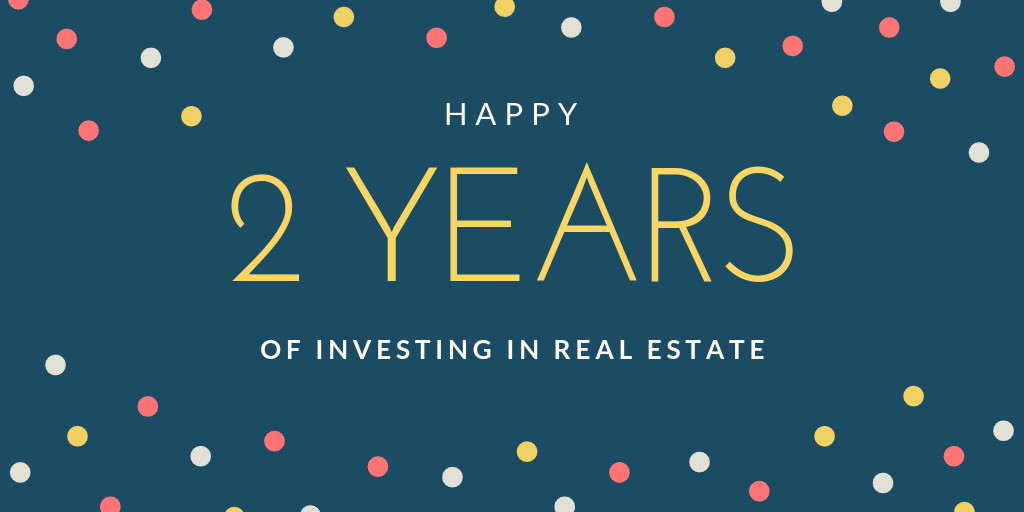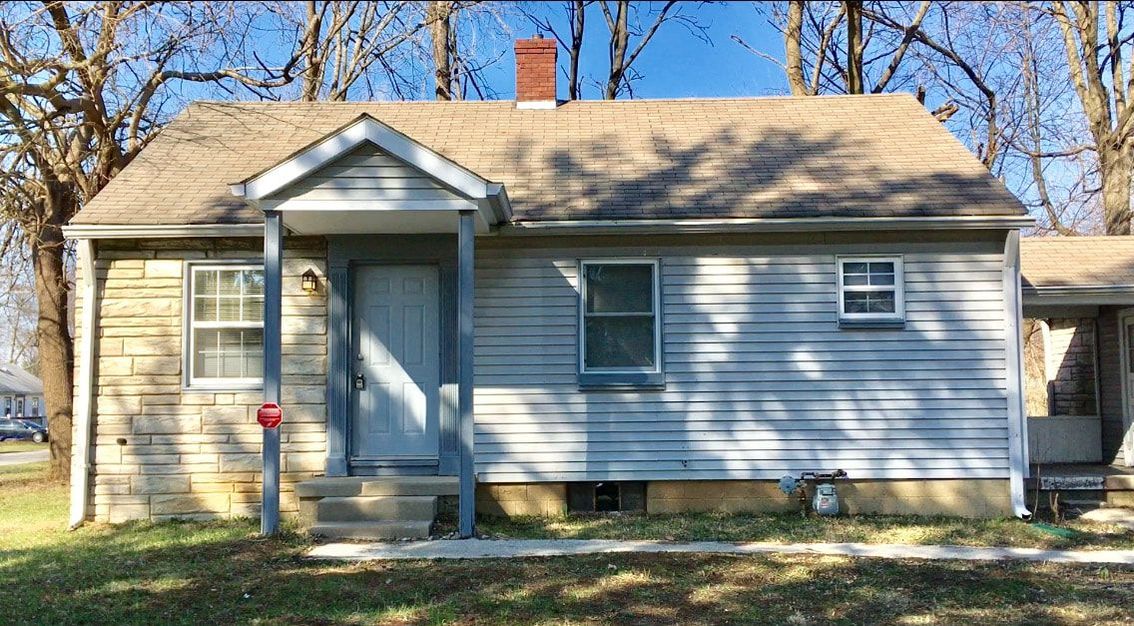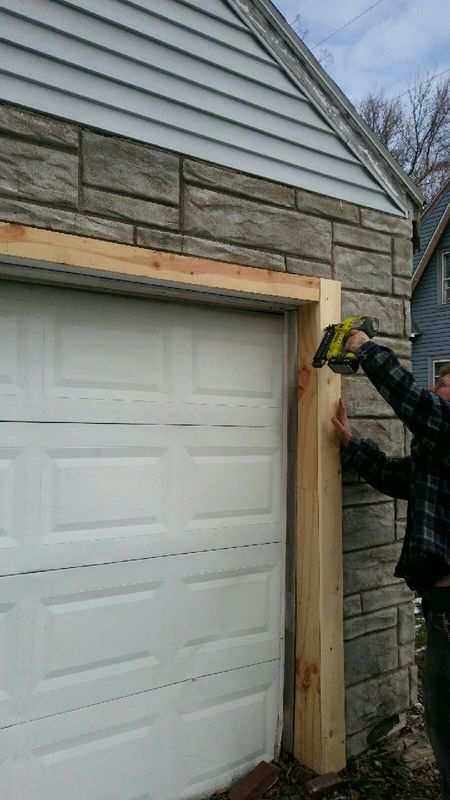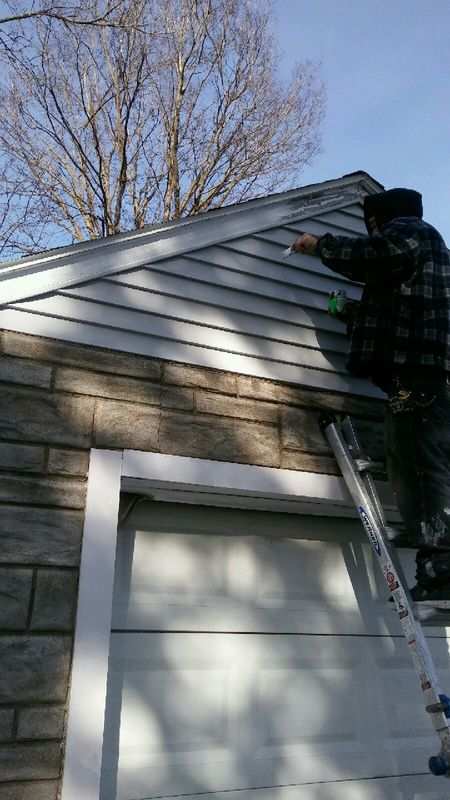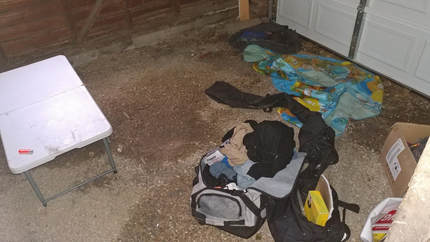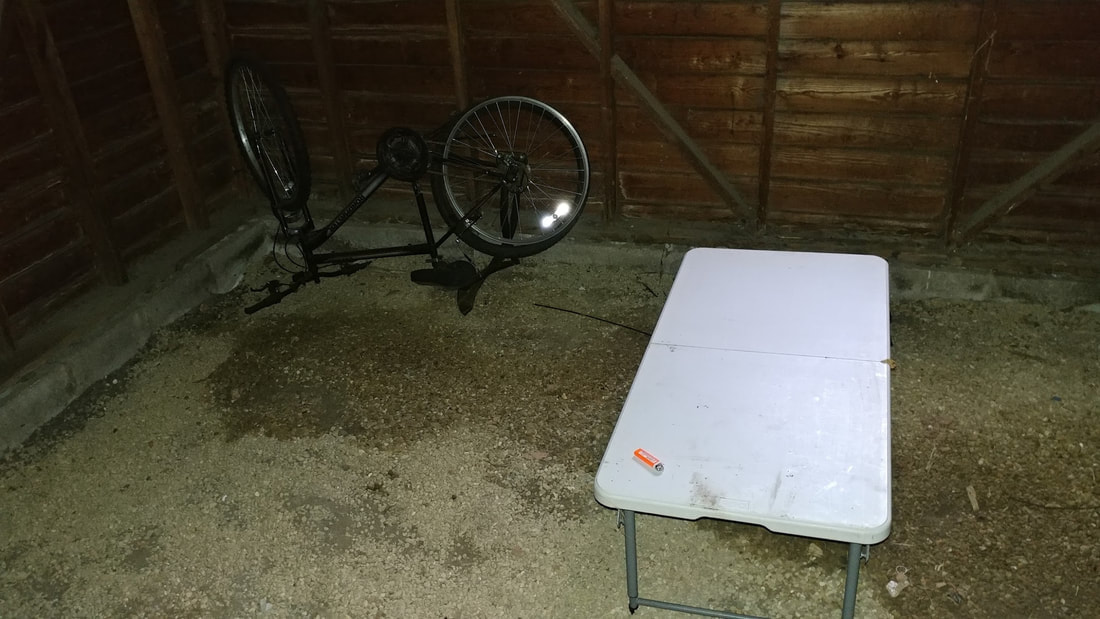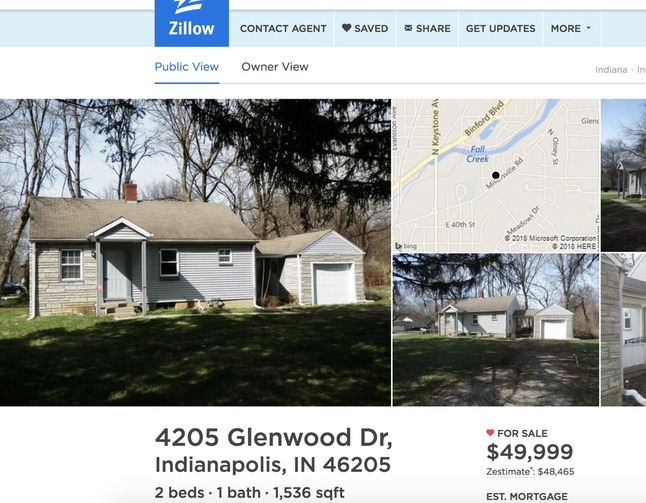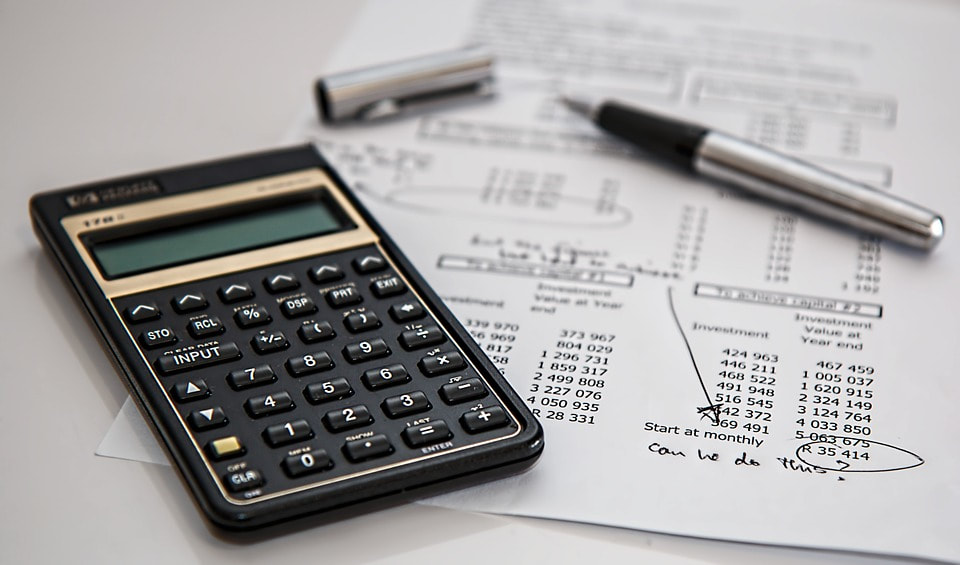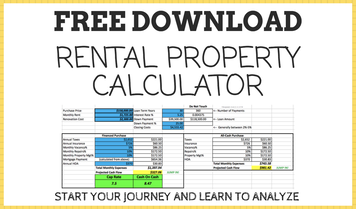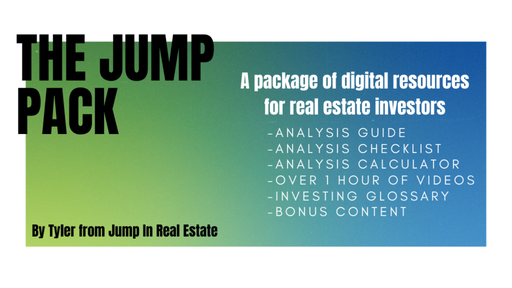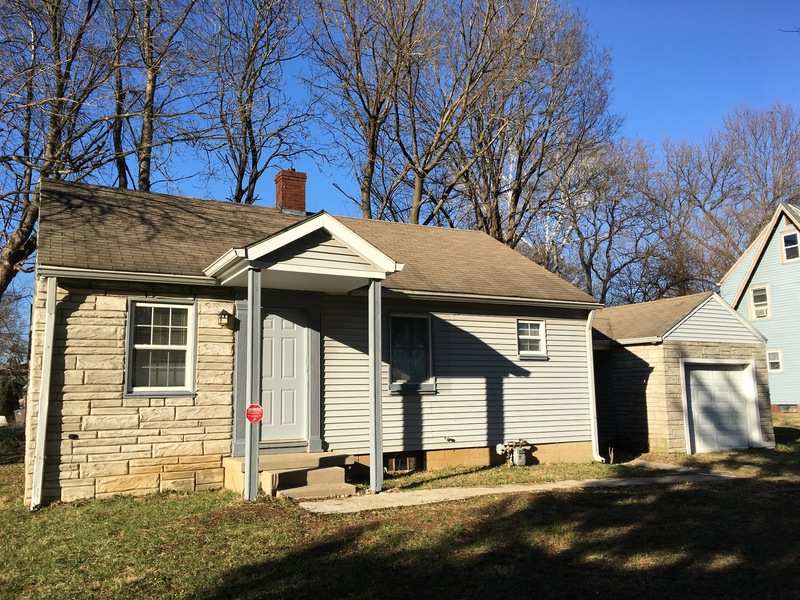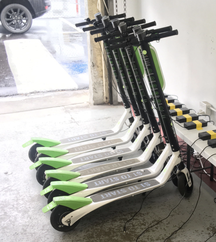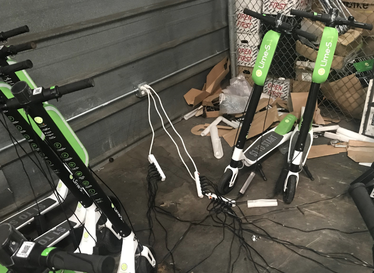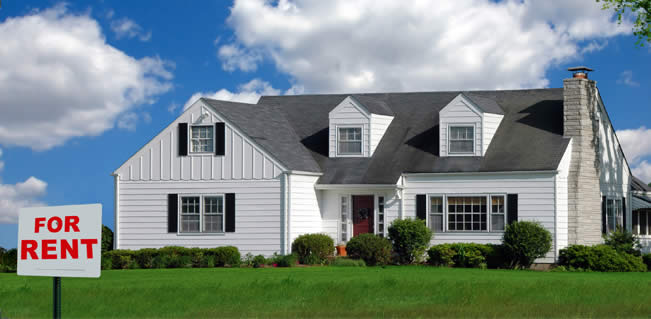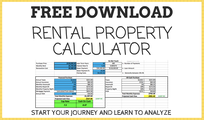|
I have to show you something real quick... That's a Purchase Agreement from December of 2016, when I purchased My First Property. WOW...I can't believe it's officially been 2 YEARS since I started investing in Real Estate. And it's been a crazy roller-coaster ride so far, to say the least. Here's a quick recap: I bought My First Property from a turnkey company in December of 2016. Everything went "smooth" for 11 straight months, until an unexpected vacancy and unacceptable management derailed the investment. With $16,000 in repairs needed, I decided to sell it. I bought My Second Property in March of 2018. I bought My Third Property in July of 2018. Then I invested in an 80-unit multi family property just this past October. I've had my fair share of bumps and bruises along the way. Tons of challenges, frustrations, and second guessing. And I know there's plenty more of that to come. But, I'll continue to learn every step of the way. And now it's my job, to share my knowledge with YOU. Here are my TOP 8 TIPS after my first 2 years in Long-Distance Real Estate Investing: 1. Network, network, network "Your Network is Your Net Worth" I live by this and truly believe it. The people you keep closest to you, create such a profound influence. You've got to be conscious of that and surround yourself with the best and brightest. I've met some of my best friends through real estate and I couldn't imagine my life without them. So, use the best real estate networking tool out there, Biggerpockets, and connect with locals that are just as ambitious and driven as you. Set up local events and meetups to chat with novice and experienced investors, agents, contractors. Business and LIFE are all about relationships. 2. Master How to Analyze Property The basics of investing start with understanding How To Analyze Rental Property. You MUST know how to quickly filter through potential investment leads, determine all expenses, and projected rents. You need an understanding of flood planes, school districts, neighborhoods, taxes, and much more. If you're looking to acquire a property, I challenge you to start analyzing 1 property a week. Then 1 property a day. Repetition will get you to a point where analysis becomes clockwork, so when that great deal pops up, you can JUMP ON IT! 3. Location, location, location When I first started investing in real estate, I didn't realize the importance of location. I just saw the numbers on paper, and assumed if the numbers on paper worked out, the investment would work out. Well, I WAS WRONG. Having a great real estate investment requires so many factors...and location is a huge one. You must understand neighborhood crime levels (I use Trulia crime maps), school districts, neighborhood classes, and neighborhood amenities (is there a Starbucks nearby?). Understand what type of tenant lives in the neighborhood (check out Neighborhood Scout). After all, your tenant is the primary source of income. 4. Interview and Vet Multiple Property Managers I've experienced working with the wrong people. And it SUCKS. Don't be like me. My first property manager decided to just NOT tell me that one of my tenants left. I only found out when my friend drove by the property and spotted a lock box on the front door. Then, I ran into $16,000 in needed repairs as the property manager never checked up on the property throughout the year. But, I take full responsibility for hiring the wrong people. And I learned real quick how to never make that mistake again! The key is to interview multiple property managers and really truly vet them. Check out my post on How to Hire a Property Manager. And if you want to work with my property manager, contact him HERE. 5. Always get an inspection Ahhhh...I was so naive a couple years ago. When I bought My First Property I admittedly was a little too trusting. In buying the property all cash, I didn't need to get a property inspection from a 3rd party company. Unless you really understand construction, rehab, and can see the property in-person, I'd say: ALWAYS GET AN INSPECTION! An inspection can and WILL save you from unexpected issues that'll cost you $. Lots and lots of $$$. 6. Don't ignore issues on the inspection report Well, I learned early on about the consequences of not getting an inspection report. But, I guess you could say I didn't learn the whole lesson. I had a relatively major issue pop up on an inspection report once...standing water in the crawlspace. I had a mold guy go out there and check it out, but I never decided to get a foundation expert to assess it. I ended up brushing it off the whole thing and tried to push it out of my brain because emotionally I really wanted the property and the numbers looked AMAZING! I eventually bought the property. Now, it's biting me in the A$$. Bottom line: don't ignore big issues on the inspection report. Take care of them or walk away. 7. Visit your market and meet your team in person Some long-distance real estate investors might disagree with me here, because technically everything can be handled remotely. BUT, having flown to my market multiple times, I can say it's an invaluable experience. You'll have a HUGE advantage if you take the time to get your boots on the ground, meet connections face-to-face, drive through neighborhoods, and really understand the culture and direction of the city. Real Estate Investing is a relationship business and meeting your team IN PERSON strengthens those relationships. Sitting down with your agent and property manager for a nice lunch goes a long way. Trust needs to be built if you're going to invest from afar, so get out there and understand your team on more of a personal level! 8. Keep a Positive Attitude and Move Forward You're going to fall down. And you might even get kicked while you're down. But, that's not only real estate or business...it's life. Being able to get back up from every challenge, move on, and LEARN is crucial to your development. This is much easier said then done, but get it in your brain, so when your next pitfall comes up, you're ready to move forward and grow. Well, as a final conclusion here, I've got some last things to touch on: A LOT has happened in the last couple years. Literally, my life has changed. My mindset has changed. My understanding of investing has changed. By the way: -I'm nowhere near "Financially Independent." This is a LONG game. I'm 2 years in. Let's chat in 20. -I'm continuing to learn each and every day. Books, Podcasts, and Meetups. Never stop. I'm excited for the future. Reach out if you have any questions, I'm always happy to help in any way possible. -Tyler
2 Comments
Faced with a risky decision? Not sure if you should put that offer in? Scared to go for it? How do you, JUMP IN? *HINT* There is no art. You just have to do it. Yesterday, I had a conversation with someone while they were analyzing a property. When I brought up neighborhood crime stats she asked, “Do you think I’m rushing into it with this property? So many things I didn’t consider. I think I am just eager to get started…" I remember those days. The days of… “how old is the sewer line?” “Are the gutters galvanized?” “What type of soil is the house sitting on?” You know…the days of analyzing EVERY LITTLE THING. The days commonly known as, “Analysis Paralysis.” But, back to her question, “Do you think I’m rushing into it with this property?”
My answer? Honestly, I can’t answer that question. That’s a question you’ll ultimately have to answer yourself. At some point you’ll have to JUMP IN without knowing everything, make mistakes, maybe lose some money, learn on the fly, and get better. Otherwise, you’ll be sitting on the bench watching… I bought My First Property before I “should” have. I was very naive (didn’t even know how to properly calculate cash flow…), but was super eager and could see the amazing opportunity in real estate. LONG story short, I got burned. But, I got out of it. I walked away. Let that one go. Am now better prepared for the future. I wouldn’t trade that experience for anything. Here’s the bottom line: if you think you’re going to learn every little thing about real estate before getting your first deal…you’ll never BE a real estate investor. Learn from this community, meet connections, find a deal, and JUMP IN. Happy Investing All! -Tyler closed on My First Property. It was a day full of excitement, optimism, uncertainty, and progress. It was Chapter 1, Step 1, of my long-term financial plan. It was my first taste of "passive income." And it was the first puzzle piece to building a life full of travelling, family, friends, #vanlife, and personal projects. 512 days later...I've officially turned the page on this chapter in my real estate journey. I closed a deal last week and sold My First Property. The past 512 days were full of crazy ups, downs, surprises, and wins. I was immersed in the greatest real estate educational course I could have ever asked for. It was a million times better than sitting around reading blogs, articles, interviews, and not taking action. And a billion times better than any guru course I could have taken. It wasn't easy, but I'm forever grateful I took a leap and decided to Jump In. So, let's get to the recap now that things have settled: In October of 2016, I decided to work with a turnkey company. Their job was to assist me in all aspects of acquiring, renovating, renting, and managing rental property. After a couple weeks of receiving property leads, I put one under contract and closed on it in December of 2016. I paid for it in cash to protect myself against a monthly mortgage payment, to avoid paying interest, and to drastically improve my monthly cash flow. If the numbers all worked out, I would be getting a 13% annual return. What's not to like about that?? Things were looking good! Renovation started! But, then there were numerous delays. Communication was more than frustrating with my property management company. Red flag, after red flag kept popping up, but I didn't take the indicators serious enough. I was focused on getting the property rented, cash flowing, and bringing in "passive income" for a Financially Independent future. More renovation delays came. Little progress was made, but with my demands I finally was able to kick the contractors into gear. Finally, the rehab phase was over and a huge weight was lifted off my shoulders. Then, I flew out to Indianapolis for a quick weekend trip. Early on, I honestly didn't have plans to fly out to Indy. I really wasn't concerned about seeing the property first-hand, but I am now grateful I pulled the trigger on that move. Why? Because I met my property manager, contractor, and most importantly, I met connections FOR THE FUTURE. I left Indianapolis confident. My property was officially on the market for rent and by the end of March, four weeks later, I GOT A SIGNED LEASE! Even though the renovation and leasing of the property took weeks longer than expected, at the end of the day, I was happy with my vision actually coming to fruition. I purchased a property. I had it renovated. And I got a signed 12-month lease for $750/month. I was well on my way to building a large real estate portfolio. I received my first rental payment while vacationing with friends in Vietnam. I was ecstatic. This was the definition of "passive income," right? Getting income deposited into my bank account while ON VACATION? Wow. Things were smooth. Literally, not much happened for 11 straight months, except the routine rental payments deposited into my account. I did a 1 year recap, where I broke down all income and expenses, and the numbers looked great! Then. Everything. Fell. APART. I got a tip online from someone that my property was vacant. So, I sent a third party property management company out there to investigate. Sure enough, the only person living in my house, was a squatter in the garage. Frustrated? Hell yeah. But, I had to tackle this head on, take control, and move forward. I put together a plan. I secured the property by installing new locks. I evaluated the damage and repairs needed (which came out to $16,000!!!). Ultimately, after a detailed evaluation, I decided to SELL My First Property. I didn't feel it would be worth it to pour more money into this low-priced asset. I pessimistically foresaw years of capital expenses piling up. I saw flaky tenants living paycheck-to-paycheck and unable to keep up with rent. Yes, the numbers on paper looked great for these low-priced investments, but by growing my knowledge in real estate every day, I knew I had to focus on a better class of property. This is where the greatest gift of My First Property came in to play. It gave me the chance to re-evaluate my investing strategy and adjust for the better. I had to let this one go. With my property listed, it sat on the market for over three weeks. In Bay Area terms (which I'm familiar with), that was an eternity. Those 25 days were brutal. Absolutely terrible. I questioned my strategies, my intentions, and MY DREAMS. Offers came in here and there in the beginning, but none of the buyers were willing to negotiate up to an acceptable amount. Then things went quiet for awhile. Crickets. I even began to forget that I was actually selling a property. BOOM. Out of nowhere, I got another offer. It was like sitting on a lake and fishing for hours, then finally feeling a little tug on the line. I had to pull this one in. Back and forth, back and forth, the negotiations teetered from one side to the other. Eventually, we agreed on a price that allowed me to not just break even, but bring in a small return on investment. We closed within a few weeks as it was an all cash purchase, and now I'm focused on the next move: managing My Second Property and purchasing My Third Property. So, what did these past 512 crazy days amount to? I'll tell you - they amounted to the greatest chapter in my life. 1. Over the past 16 months, I got a 3% return on my investment, which is better than any savings account I could have parked my money in. That's a huge win in my book considering the challenges I ran into over the past few months. 2. I re-adjusted my investing strategy in Indianapolis. I now only target houses in the $75k-$100k range that rent for over 1% per month. Higher rents = a better class of tenant. 3. I purchased My Second Property, which is a much stronger investment than My First Property. I bought it for $86,000 and it's currently rented to a quality tenant for $995/month in a B class neighborhood. 4. I now completely understand the importance of having a top notch and trustworthy property management company. Having vetted multiple companies, I can now teach you how to hire one. 5. I met some of my best friends through putting myself out there and networking. We all connected online because of our similar mindsets and passion for real estate. Your net worth is your network. 6. I started this blog and truly believe I can bring amazing value to Jump In Nation. I talk to investors daily and love it. I publicly posted my phone number on this site...so seriously....you can call or text and I'll get back to you My life has transformed because I decided to Jump In to real estate. I wouldn't trade this adventure for anything. If you haven't already, read the complete story of acquiring, renovating, renting, and selling My First Property HERE. If you have any questions, leave them in the comments section below or shoot me a message. Seriously, love you all! -Tyler
So, it's time to buy a rental property. You're probably feeling good, you're juiced up, and you're excited because with every property acquired you see yourself getting closer to your financial dreams. But, great deals aren't always easy to come by.
You have to be quick, concise, and really KNOW YOUR NUMBERS!
This post will teach you how to quickly analyze buy-and-hold investment property, so you can ultimately determine if you've got a good buy or a bad one.
THE FIRST STEP? Download my free Rental Property Calculator HERE.
Now that you have my FREE rental property calculator, take a SUPER quick look at these three indicators of a good investment:
1. Does it meet the 1% rule? There's a good chance that if you can get at least 1% of the purchase price in monthly rent, you've got a cash-flowing property. For example: if you purchase a property for $100,000 it should rent for at least $1,000 per month to cash flow. 2. Can you get it for UNDER market value? Take a look at what properties are selling for in the area and what properties have sold for in the past 6 months. You can gather this info on Zillow, Trulia, or through your agent. That should give you a rough estimate of what the property is worth. Now, can you negotiate the purchase price down and acquire it for under market value? If yes, you've got yourself some built in equity and value! 3. Is it in a good neighborhood? Stay away from war zones! Don't buy in crime stricken neighborhoods. The financial numbers on paper might look great for that crack house on the corner, but believe me, you'll run into more issues than you can handle. I love the crime map overlay on Trulia. That's where I usually go first to scout out neighborhood safety. If the answer is YES to all three questions, you're well on your way to finding a great investment property. Time to dig a little deeper! Understanding Expenses We need to understand all the expenses that go in to owning the property. Typically, they'll look like this:
Take these amounts and subtract them from your expected rental income. Whatever is left over is "cash flow" baby! If you have NOTHING left over, or even worse, the expenses are more than expected rent, that's a pretty clear sign this property will not work out from a cash flow standpoint. Here's a breakdown of each expense and how to calculate them: Mortgage This first expense might look intimidating to calculate, but it's really not. I use www.Bankrate.com for a quick mortgage check. Enter the amount you wish to borrow (which is purchase price minus your down payment), enter the interest rate, and enter how many years the loan will be. Bingo! There's your estimated monthly mortgage payment. Property Taxes Sites like Zillow, Trulia, and others show historical data on property tax history, however, the most reliable source I count on is the local county website. For example: I invest in Indianapolis and use the Marion County property taxes site. Always verify using the county website! Insurance Finding the cost of insurance will require you to call a few agents. I recommend getting three quotes from different insurance providers and analyze how the rates compare. Once you start getting familiar with your market you'll better understand the general costs depending on square footage and specific neighborhoods. Property Management Fees Property managers typically charge 6% - 10% of monthly gross rent and a one-time fee when a new tenant moves in. I would also recommend interviewing multiple companies and reading this complete guide on how to hire a property manager. Vacancy This is the amount in rent you expect to lose during a vacancy. As a little cash flow "buffer," it's comforting to save some of your monthly rental income for an unexpected vacancy, or if there's a vacancy during the turn-over of a unit once a renter leaves. I usually build in 5% of gross monthly rent for this category. Future Repairs This is one of the toughest expense categories to determine. Random repairs can come up in bunches, or you could go months, even years, without major maintenance needed. Be conservative when you're new to investing and save anywhere from 10% - 20% every month for repair expenses. Home Owner's Association Dues These expenses are not applicable for all properties. They're typically a monthly fee charged by an association for providing value to a condo or town home community. Some HOA's come with pools, community rooms, gyms, or other amenities. A quick call is all that's needed to find details on this expense category and how much it'll put you back per month. Understanding Income Now, we'll cover the income side of the things, which for a single-family homes, is usually just one category. RENT. Rent In order to determine what your property will rent for it's best to gather data from several different sources and average them out. I recommend taking a look at these four resources: 1. www.Rentometer.com - great website for comparing your rent with other local properties. Simply enter the property address, number of bedrooms, and see what the low, median, and high rents are in your area. 2. Reach out to property managers - email or call local property managers and have them assess your property. Their job is to understand the rental market and they should be able to give you accurate data. 3. Craigslist - scour Craigslist and see what similar properties are renting for in the area of your targeted investment. If you want to take it a step further, you can even post a fake ad on Craigslist for your potential rental property and see what kind of feedback you receive. For example: if you list a property for $1,000 and get crickets, you probably won't be able to receive that amount in monthly rent. You'll have to update your projections to a lower rent amount. 4. Zillow or Trulia - I tend to NOT rely on these for monthly rental estimates, but it's always a good tactic to at least take a look.
So there you have it...it really isn't quantum physics. These are the typical expenses and income categories you can expect from single-family rental property. Subtract your expenses from your income and you've got your cash-flow number. I personally will never buy a property that doesn't "cash flow," but everyone has their own investment criteria. So, have a strategy and stay firm with it.
Need help analyzing a deal? I'd love to help! Shoot me a message and let's chat!
Want to sharpen and take your property analysis skills to the next level? Then, The Jump Pack is for you. I created this package of digital resources to improve your property analysis skills. It includes: a property analysis guide, analysis checklist, analysis calculator, over 1 hour of videos, an investing glossary, plus more.
Now, before I conclude this post, I have a challenge for you: start analyzing 5 properties per day. Just do it! Get in the hang of looking up expenses and estimating rents.
ALSO - read this post on the nuts and bolts of calculating Return on Investment (ROI). I'll literally show you the exact formulas and equations needed to calculate ROI. Best of luck! -Tyler Well, it's officially been a year since I closed on my first rental property. By now, you should know the full story (which is still ongoing...), so let's get to the bottom line...how much money have I made? How much have I lost? Was it worth it?? Here's a quick snapshot of the numbers
All in all, I'd say it's been a pretty successful year on paper. If you take my Total Rent Collected ($750 x 9 months) MINUS my Total Expenses (*which includes a trip to Indianapolis to visit my property*), I've got a pretty nice cash flow of $313 per month (EVEN with a 3 month vacancy for renovation). Here's a general breakdown of my expenses over the past 12 months:
*UPDATE* It's definitely not all rainbows and butterflies! These numbers on paper look good, but the property is now officially vacant, to my surprise! I'm working through a plan right now to get it back up and running. Has the last year been a piece of cake? Heck to the NO. At times, it's been the complete opposite of stress-free. There were many moments of being nervous, scared, and uncertain. Long-distance communication started off rough initially with my property management team, and it still continues. Meaning...it might be time to make a switch. SOON. But, it's forced me to be proactive, hold people accountable, and build a new network of individuals locally and in Indianapolis. I've met so many great people throughout the past year and a number of them have become some of my best friends. A bunch of us are going to a go cart track in a few weeks to hang out, laugh, have a good time...oh yeah, and chat real estate. A few of the biggest takeaways from my first year in real estate: BUILD A REAL ESTATE NETWORK. Meet as many people as you can that are in the industry, regardless of their age or experience. Attend Real Estate Investing meetings, or better yet, pick your favorite bar and host your own (I did!). Pick up the phone, send emails, and talk with complete strangers you meet online. My first mentor was a random guy in Dubai who just wanted to Skype (what's up Morgan!). Utilize one of the most valuable online real estate resources: BiggerPockets. Never stop learning, whether that's through podcasts, blogs, YouTube, books etc...you literally NEED to get in the habit of learning something new each and every day. Never stop growing. Crunch the numbers. If you're planning to Jump In and use the buy and hold strategy, make sure you're cash-flowing right away. Just because you can get $1,000 per month in rent, doesn't mean you actually GET $1,000 in your pocket. Factor in property taxes, mortgage, insurance, property management, vacancy, maintenance, capital expenses. Do your homework and learn how to analyze property HERE! Hire an amazing property manager. Your rental property is a business. You are the CEO. But, your property manager runs the day to day. Without great property management, your business will not succeed. Period. Interview multiple property management companies, talk to referrals, ask as many questions as you need answered, after all, you're trusting them with your investment and you money. Luckily, I have a step-by-step guide on How to Hire Your Next Property Manager HERE. Welp, it's been one heck of a year, I wouldn't trade it for anything, but I've got to go and acquire property #2...leave a comment below, shoot me an email, let me know how you're doing. Peace. Happy Investing. -Tyler Real quick...if you haven't read Chapter I of "Why Real Estate?" I'd strongly recommend you go back for some context. You'll see the journey I took to arrive at real estate and why it's best for my long-term goals. Now that you know I'm 100% ALL IN on real estate, let's talk about the amazing value this investment vehicle provides. Here are 11 great benefits of investing in real estate: 1. Consistent cash flow. This is the primary reason that got me hooked on buy-and-hold real estate. Don't get me wrong, this is by no means guaranteed. You need a lot going your way to achieve this, but with a great property manager (that finds great tenants and is quick on maintenance requests) and a property with sound infrastructure (limiting capital expenses), you'll watch the rent checks roll in every month. 2. Gain more leverage. Real estate is an investment where using the bank's money is a great option (but make sure to run your numbers!). The ability to make a down payment, leverage your capital, and increase your overall return on investment is amazing. 3. Tax-free Growth. Even if you buy a property with the purpose to hold it, long-run appreciation is realistic and you must consider a tax-deferred strategy. As an exit strategy, you can consider a 1031 exchange, charitable trust, or an installment sale to lesson your tax liability. 4. Tax free cash flow. Because of operating expenses, property taxes, insurance, mortgage interest deductions, and depreciation (even if the property gains value) your cash flow could be tax-free. Don't forget that rental real estate is a business. This means that travel expenses to check on your properties and payments to family members who manage your properties can be deductible as well. Often, an investor will never pay taxes on their cash flow and can wait for capital gains on the sale of the property in the future. 5. Tax write-offs against your other income. Depending on your classification as an Active Investor or Real Estate Professional, an overage of tax deductions can be used against your other income. But, before you dig too far here, please, please, please discuss this with your tax professional before investing. They're the experts. 6. Rental real estate is a forced retirement plan. Americans are terrible savers. But, we're great at consuming (read: The Millionaire Next Door...seriously). I read that most of America doesn't have $1,000 in savings...YIKES! Well, here's your chance to start thinking long-term. Saving for a rental property and acquiring one takes a significant commitment and determination. Jumping In to real estate in the long-run could be the greatest decision you've ever made to build future cash flow and wealth. 7. You have control. In real estate, you choose the investment market, you select the neighborhood, you buy the property, you agree on an acquisition price, you decide on renovation specifics, you pick a property manager, whom selects your tenant. This is your company. You are the CEO. Responsibility is 100% on you and with that, comes complete control. 8. Appreciation. Not always guaranteed, but rental properties normally appreciate in value with inflation. Increased value = reinvestment in higher value properties after you sell. Or, a sale can provide an equity line of credit to use for other investments. 9. Inflation-proof investment. Rents usually increase with inflation, while mortgage payments on the property remain stable if you have a fixed loan. This increases cash flow, without the increased expense for holding the property! When inflation goes up, it can mean more renters (as mortgages become more expensive). More renters = more demand for your rental = ability to increase rents. 10. Paying down loans - Paying down loans frees up more investment resources to increase leverage. You have can use the increased equity in one property to free up funds and invest in others. 11. Property improvement for equity (forced appreciation) - Many investors intentionally purchase properties below market value, because they require renovation. If you're smart, a nice little rehab will increase the value of the property, resulting in an immediate increase in equity. Now that you've read just a few of the greatest benefits of Real Estate, take a look at my in-depth journal of buying, renovating, and renting my first out-of-state property! -Tyler Why invest in Real Estate anyways? Why not just leave money in a safe savings account accruing a consistent (but, TINY) return? How about playing the stock market? Or giving it to Fidelity to let them do their thing? Well, to completely understand the "why real estate?" question, we have to start from the beginning. Let's start with The Journey. PART I It all started in 2016, when I made a concentrated effort to invest in myself. I was stuck in the routine of waking up, heading to work, coming home, eating dinner, falling asleep, repeat, repeat, repeat. While I was getting great short-term work experience in my industry, I wanted to better myself, grow, and gain overall knowledge in areas such as business, finance, and long-term investing. Because knowledge is power. What jump started everything? PODCASTS and BOOKS. Listening to podcasts at the gym instead of music became my norm. Reading books every night before sleep was part of my new routine. My Favorite Business Podcasts PART II I started REALLY thinking long-term. Where did I want to see myself in 10 year? 20 years? 30 years? What's my ideal lifestyle? And the answers were really simple...I wanted (and still want):
PART III How would I achieve those three long-term goals? It came down to finance and investing. I needed to: Increase monthly income: in addition to my W-2 salary, I began working for Instacart as a side hustle. A couple times a week (after work and on weekends), I was a personal shopper and delivered groceries. I also made a conscious effort to purge my old junk/clothes and sell them on Craigslist. $20 here and $15 there add up and helped me acquire My First Property. Reduce monthly expenses: for most of us, rent/mortgage is our biggest expense of the month. I was paying $1,300 a month in rent and needed to get that number down ASAP. SO, when my lease ended, I moved to a new apartment with 3 roommates for $800 a month. That's an additional $500 per month in my pocket! What else did I do? Common sense things...like brought lunch to work everyday instead of eating out. Also, bought a moped, which gets 90 miles per gallon, and limited my car driving. I could go a full month on one gallon of gas! Diversify income streams: I had to find multiple ways to bring in income so I wasn't relying solely on my full-time 9-5 job. This was partially addressed with my Instacart side-hustle, but I needed to do more. So I started a travel website and produced content, which brings in revenue. Take a look at yourself, and see where you can provide true VALUE to the world. Do people always ask you specific questions around certain topics? If they do, there's the foundation of your next business model. Bring in reoccurring income while not having to work full-time: well, this was ambitious and the ultimate goal. And I'll admit, I was struggling to address it. PART IV While I began to focus more on personal finance and long-term goals, I was frustrated every month. I'd get my pay check on the 1st, but watch half of it disappear straight to my landlord. However, through that frustration appeared the greatest gift. I saw the opportunity of real estate. My landlord was sitting back, relaxing, and collecting monthly checks, so why couldn't that be me? *BOOM* there was my answer to bringing in reoccurring income. I had to become a landlord. PART V One big problem: every property in my area (San Francisco) was well over $500,000. I didn't have that kind of money!! But, did that stop me? I had to get creative and think outside of the box. Three words: Always Keep Learning. PART VI Jumping head-first in to Real Estate, I started soaking up real estate podcasts, blogs, books, and anything I could get my hands on. Through my educational journey, I learned that buying out-of-state, where properties were more affordable, was a realistic possibility. PART VII I guess the rest is history. I jumped in, found a property in Indiana, renovated it, got it rented, and now collect monthly rental income. Read My First Property for an in-depth journal of buying, renovating, and renting my first out-of-state property, or continue to Part II below: What's been your "Journey" into the world of Real Estate investing? We'd love to hear your story in the comments section below! -Tyler Whether you're looking for your first property, your next property, or just trying to accelerate your voyage to financial freedom, you're going to need some cash. Here's where a good Side Hustle comes into play. We're in the age of the Side Hustle. Or the Gig Economy. Our generation is finding more and more ways to bring in revenue. We're diversifying our revenue streams. I love it! So, what exactly is "side hustle?" It's a way to make some extra money, outside of a full-time job, that either allows you flexibility to pursue a passion, or it could even BE your true passion. Take a look at these great side hustles that will accelerate your income and help you purchase your next property: Instacart My primary side hustle in 2016. Basically, I was a personal grocery shopper...I'd drive to stores, pick up specific items, check out, and deliver them. A couple times a week, I'd leave my office job for the day around 5:30pm and work from 6pm to 8pm. No, I didn't get rich off of Instacart, but an extra 40 bucks here, and an extra 50 bucks there definitely helped. Check it out and SIGN UP HERE. Lime Scooter Juicer Ever see those electric scooters zooming around town? They are EVERYWHERE in Oakland (where I live). Well, someone has to charge them at night. And that someone is ME. I'm a Lime Scooter Juicer! Yup, after work on my way home, I pick up a couple scooters here, and a couple there...bring them back to my place, plug them in, let them charge overnight, and drop them back off on the sidewalk in the morning. I get paid on a per-scooter basis and am pulling in $8 minimum per scooter. So, the 4 scooters I charged last night brought me $32 this morning...all for about an hour worth of work. I plan to make $500+ a month on this side hustle....and this money is going straight toward my next investment. To become a Lime Scooter Juicer, DOWNLOAD THE APP HERE and get $3 credit from me! I'd recommend trying a scooter at least once before signing up to become a Lime Scooter Juicer to increase your chances of getting the job. Rover My girlfriend's primary side hustle. She loves dogs, so naturally, taking care of them, walking them, and getting paid for it is a natural fit. She's built numerous relationships with local dog owners too, so you could (if you want) skip the middle man (Rover) after you build your network and keep 100% of the revenue. Shopkick This is a shopping rewards app, so I wouldn't technically count it as a side hustle. But, it's a vehicle to bring in extra cash. How does it work? Earn points by walking into specific stores (it uses GPS technology), and scanning certain items. You can then redeem these points for rewards such as Amazon, Walmart, and Target gift cards. Here's how I use the app: if I head out for a little lunch break at work, I'll stop by a store and scan a couple items. That way I'm making some extra cash on my lunch break! DOWNLOAD THE APP HERE. Uber/Lyft (Ridesharing) I can't personally speak on life as a rideshare driver, since I've never been one, but the thought of it has ALWAYS been intriguing. Partially because I feel like I'd get a chance to meet such a wide variety of people. Life's all about connections. And you'd be paid for it! My thought though: make sure you have a fuel efficient car. *UPDATE* I actually signed up and am driving for Uber now! I'm experimenting with the whole "networking" opportunity of being stuck in a car with strangers. I'll let you know how it goes! Airbnb Also can't speak for using Airbnb as a side hustle, but if you have an extra room at your place...why not consider renting it out and making a little extra cash? Sign up to be a new HOST HERE. And if you just want to use Airbnb for your next trip, SIGN UP HERE for $40 OFF! Etsy Are you creative and can create a tangible product? Maybe it's time to start selling it online. Start your mini-business today! Craigslist Go through your closet, look under your bed, take a peek in the garage, and get rid of all the crap you haven't touched in a year. De-clutter your life! And add some digits to you bank account. Also - if you're at a garage sale, try to bargain down items that you can later flip for a higher price on Craigslist. Believe me, some people do this for a living. Taskrabbit Basically, people will post a job (such as...I need help constructing my Ikea table!) and you'll take on that task for a set price. Write Content and Start a Blog What questions do your friends always ask you? What skills or experience do you have that are unique? Answering these questions could be the foundation for a new online business. Take this blog for example: people still find it crazy that I buy real estate 2,000+ miles away from where I live. So, what'd I do about it? I started writing content, providing value, and building community. With consistant writing and an engaging audience, you can monetize your website through advertisements, affiliate links, ebooks, and online courses. This list of Side Hustles could go on forever... Bottom line: if you are struggling to save for a rental property, or want to accelerate your savings as I did, finding a side hustle can be critical in your investment career. So get yourself a side hustle! And check out this solid list of 99 side hustle ideas HERE! Do you have a unique side hustle? What is it? Leave a comment below! -Tyler It's time to get personal. It's time to open up. It's time to document, in excruciating detail, my journey as a newbie real estate investor. My biggest priority right now is to acquire a rental property in the next month, get it rent-ready by early 2017, and start collecting monthly cash flow in the form of good 'ole rent. Here's perhaps the biggest challenge: I'm looking for a property that's 2,300 miles away from where I live. Let me lay it out real simple - I live in the San Francisco Bay Area. I'm looking to buy a house in Indianapolis, Indiana. A place I've never visited... I have NO IDEA where this new endeavor will take me, but I know the Jump In Real Estate community will play a key role in furthering your education, as well as mine. Because real estate is all about the Ups, the Downs, the frustration, the challenges, and the wins. So, follow along by hitting the nice pretty button below: I promise there will be lots of pictures, actual numbers, and videos! And hopefully, this is property #1 of many, as I work my way toward a life of Financial Independence, a.k.a...EARLY RETIREMENT! With that, I'll leave you with a few of my favorite quotes from the great Jim Rohn...along with a few of my own notes too: "Happiness is not something you postpone for the future; it is something you design for the present." - Why does much of society accept the fact that they have to work until they're 65?? Design you "dream" life now! "If you don't design your own life plan, chances are you'll fall into someone else's plan. And guess what they have planned for you? Not much." - Craft your life plan, Jump In, and take action! "Formal education will make you a living; self-education will make you a fortune." - The value of continued self-education AFTER high school, AFTER college, and AFTER grad school, will positively alter your life. "If you really want to do something, you'll find a way. If you don't, you'll find an excuse." - Bottom line: once you've crafted your life plan and committed to continued self-education, you have to execute. Find a way, not an excuse. Just do it. Take Action! JUMP IN!
The theme of "get off your butt, and jump in!" routinely arises in every Real Estate podcast I listen to, blog I read, and mentor I speak with. As someone who religiously works off of a "to-do" list, I've had the task of "real estate investing" taunting me for over a year. That's changing tomorrow. I'm making a move. I'm excited, nervous, and have no idea what to expect. The potential of "passive income" has finally pushed me to take action. I'm determined to build monthly cash flow for a future of financial freedom, more time with family and friends, the ability to travel whenever, and work on my own schedule. |
Investing |
Jump In |

